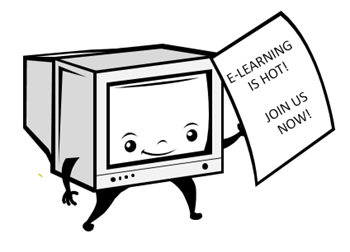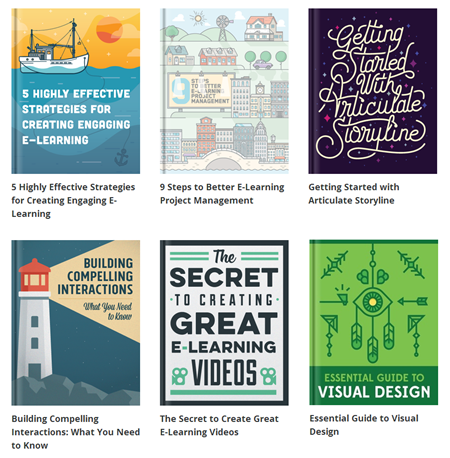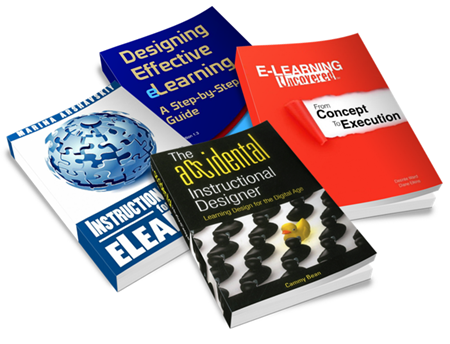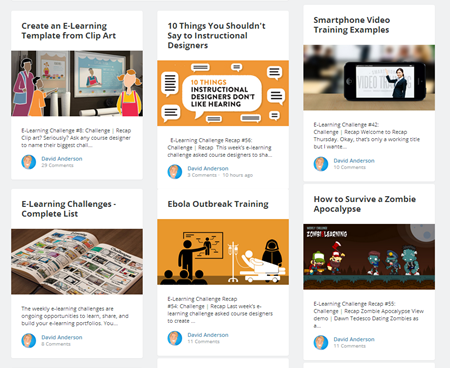I completed my the Applied Technology & Performance Improvement program at University of North Texas and my Master’s in Instructional Technology at University of Houston – Clear Lake.
Both great institutions and programs. 🙂

Now’s a good time to get started in the elearning industry. It’s still growing and doesn’t look like it’s going to slow down any time soon. Knowing how to get started with elearning is one of the most common questions I get. People usually want to know about schools and formal education as well as where to gain practical skills.
One of the challenges for today’s designers is that the authoring tools are easier to use and empower you to create all sorts of interactive content. That means you are doing more to create your courses which means you need well rounded skills.
When I build elearning courses I try to answer three questions because they help guide how I’ll approach the course:

Based on these questions, here are a few skills that are critical for course design:
Obviously, there’s more to course design than those skills, but that’s a good start. What would you add to the list?
In the past we’ve discussed whether or not you need an instructional design degree to be successful. There are pros and cons. However, if you do want to go to school, which ones are best?
You don’t need to go to a Master’s program to learn about elearning. Many schools offer very good certification programs. They take less time, cost less, and typically focus on practical application.
Personally, I’ve had friends go through the programs at San Diego State University and University of Washington. I’ve also been impressed with what people have been doing at UMBC, Boise State, and Bloomsburg.
Here’s a list someone in the community compiled of schools with different programs. If you attended a program at one of these schools or another, please share your thoughts and recommendations in the comments. Just so you know, I’m just looking for feedback from graduates to help blog readers; so I’ll delete spam links from schools.
There are all sorts of open degree programs and MOOCs that help you learn more about things related to elearning and instructional design. MOOC List is a good resource. Here are a few classes that are relevant to course design. You can search for more.
Of course, that requires the same type of discipline you’d need in a more traditional learning environment. If you want something less formal, try these resources in the elearning community. They’re relatively short and can be reviewed at your own pace or when you want to learn at the point of need.

Here’s a list of book recommendations that cover a broad range of topics.

Here’s a question: Assuming you went to school to learn about instructional design, what are some of the books they had you read? Feel free to list them in the comments.
Reading books and going to classes are both valuable activities. But the key is that you apply what you learn to real projects. That’s one of the reasons I like the weekly elearning challenges. They’re a great way to practice little things. And to see how others have approached the same projects.

The one step missing in the challenge is soliciting feedback. That’s up to you. Submit a project and ask for specific feedback. Be forewarned. You have to have thick skin, ask for honest feedback, and be willing to hear it and apply what is being advised.
Here are other posts on becoming an elearning pro:
The elearning industry is hot and now’s a good time to get started. There are a lot of ways to move forward from formal education to informal practice and application. Ultimately you want to gain the skills so you can demonstrate your understanding of course design and ability to meet the organization’s needs.
Is there anything you’d like to add? Books? School experience? Feel free to add your thoughts to the comments section.
 |
 |
 |
|
Want to learn more? Check out these articles and free resources in the community. |
Here’s a great job board for e-learning, instructional design, and training jobs |
Participate in the weekly e-learning challenges to sharpen your skills |
 |
 |
 |
|
Get your free PowerPoint templates and free graphics & stock images. |
Lots of cool e-learning examples to check out and find inspiration. |
Getting Started? This e-learning 101 series and the free e-books will help. |
I completed my the Applied Technology & Performance Improvement program at University of North Texas and my Master’s in Instructional Technology at University of Houston – Clear Lake.
Both great institutions and programs. 🙂
I am in the Masters program at UMBC and I have learned a ton, even with over 10 years of experience under my belt. I love that the program has such a focus on performance improvement as a whole and how ISD fits into that. The UMBC certificate programs pull from the same core courses as the Masters program and most of the courses require hands on experience with a client.
Some of the books we have had to read include ISD from the Ground Up (Chuck Hodell, who is the advisor for the UMBC program), the ASTD Handbook, several ASTD Infolines and collections, and Adult Learning Methods (Galbraith).
I’m always happy to answer questions about the program!
Langevin Learning Services offers an e-Learning Specialist Certification Program that allows you to select courses that are tailored to your area of expertise (i.e. asynchronous WBT tutorial-style e-learning vs synchronous virtual classroom training). The courses are practical and focus on the need-to-know, rather than bogging learners down in outdated theory.
I was very impressed with my learning experience at the University of Wisconsin-Stout. They have an on-line Master’s program for Education that also offers a certification in Instruction Design. The classes includes real world experience in creating eLearning modules, program management and the psychology of learning.
I do a presentation on this topic and I break it down into five skillsets. They are:
* Instructional Design/Writing
* Graphic Design/GUI-Visuals
* Media Production/AV & VO
* Technical/Authoring Tools & LMS integration (SCORM, xAPI)
* Subject Matter Expertise
I start the presentation with a job description that includes all these skills and everyone laughs… unfortunately it is too true! We’re expected to be like a superhero. Then I go into how someone learns each of these skills; they are each entire degree programs. The point is that it takes a team to develop great eLearning that incorporates good practices for each of these elements. You should partner with those who have skills that aren’t your strengths. Many people have a couple of these skillsets. Very few have all of them.
I graduated from Boise State and would recommend their program. They do have an Ed Tech program which you mentioned, but they also have a really great program called “ORGANIZATIONAL PERFORMANCE AND WORKPLACE LEARNING (OPWL).” This is the program that I graduated from. Great professors and good balance of theory and hands on experience. This is a Masters program and they also offer certificates in eLearning, instructional design and performance improvement. You can do the whole thing online too. Check it out: http://opwl.boisestate.edu/
It’s a great list. I’d add that it’s important to understand how English language difficulties will impact learning programs. Many companies have non-native, English-speaking employees, and most companies want an international presence. English is our common language. There’s a huge difference between learning programs made for native English speakers and learning programs that will work with non-native employees.
Hi Tom, this post is wonderful, it has excellent sources and it is a very good point to start. I began to study instructional design three years ago, but here in Brazil there aren’t many ID degrees. So I decided to study by myself, and I would like to share my experience, if it can be useful to somebody.
Blogs:
Your blog was the most important of my studies. I spent hours and hours and hours reading the posts, taking notes, testing features. After I discovered the Word of Mouth blog and it’s Weekly Recap, and Cammy Bean’s and Connie Malamed’s blogs. The challenges are an excellent way to practice and to know people that is always available to help.
MOOCs:
MOOCs are the paradise for those who love to study. But there is a keyword to be successful in MOOCs: discipline. A lot of discipline. I never found a MOOC specific about Instructional Design, but there are courses that may be interesting.
The most fantastic MOOC I did was “Design Thinking Action Lab” of Stanford Online, but I don’t know if they plan to open a new course.
I loved “Elearning and Digital Cultures” (Coursera), it’s less practical and more conceptual, it discusses the utopic and distopic views of the digital culture and new ways of learning. “Gamification” (Coursera) is a very good course, but unfortunately I didn’t finish it.
Other MOOCs I recommend :
“On Strategy: what managers can learn from great philosophers” (Coursera) – very very good – part 2 begins in February 2015, but I think that it’s possible to watch the videos of Part 1. “Child Nutrition and Cooking 2.0” (Coursera) – hey, someone has to cook in this house, right?
Books:
Tom’s lists are absolutely complete, I always follow his recommendations. I have a book that I didn’t see in the lists above: “The Art of Explanation“, by Lee LeFever.
That’s it!
The Instructional Design certificate program at the University of Wisconsin Stout is complete and thorough, led by knowledgable, personable experts. I’ve thoroughly enjoyed pursuing ID education there and have applied almost everything I’ve learned there immediately!
I have my BFA in New Media through the University of Lethbridge, and to supplement this I finished a quick 4 course e-Learning Certificate through University of Calgary Continuing Education. It was all done online and we had people attending from around the world (but mostly from Alberta, Canada).
I am now working on my Certificate in Adult Learning Specializing in e-Learning online. It’s been a really useful program so far. They also offer specializations in Adult and Community Education, Career and Academic Advising, and Workplace Learning. As someone who was new to this area when I started my job, the courses I took were super helpful.
Perhaps I missed this is your column, but I think it is worthwhile for e-learning personnel to attend/participate in professional development events such as those listed on Stephen Downes Blog, Nov. 14, 2014 Educational Technology Conferences #32 January to June 2015, http://www.downes.ca/post/63010
If the individual is business or training oriented, I would recommend the conferences below.
September 30-October 2, 2015 DevLearn Conference and Expo (focuses on the use of learning technologies). Organized by the eLearning Guild. MGM Grand, Las Vegas, Nevada, USA. http://www.elearningguild.com/content.cfm?selection=doc.24#devlearn
February 9-11, 2015 Training Conference and Expo. Organized by Training Magazine, 38th annual. Georgia World Congress Center, Atlanta, Georgia, USA. http://www.trainingmag.com/training-magazine-events
April 24-29, 2015 International Performance Improvement (ISPI) Conference, 53rd. Organized by the International Society for Performance Improvement. Hyatt Regency San Antonio Riverwalk, San Antonio, Texas, USA. http://www.ispi.org/
If the individual works in an educational environment, then I would recommend the conferences listed at the top of the page here: http://contactnorth.ca/training-opportunities/upcoming-conferences
Excelent post! I’m going to start my master degree in ID in Walden University next January. I decided this program because is completely online since I’m based in Australia. I’m learning a lot with this community and specially the rapid e-learning blog 😀 thanks for sharing all these resources.
I attended Bloomsburg University and used their online program. I achieved a Masters in Instructional Technology (MSIT). I liked it because it was a well-known brick & mortar school that was/is a leader in the e-Learning field. I had a set schedule of classes with live professors instructing and students participating via online connections from all over the U.S. I believe it to be a well rounded curriculum and recommend it to anyone interest in the ID field. I have applied many skills learned in my classes to enhance my online training modules in my current position.
@ tom i really like this paragraph.as of your explanation is very good . I like this paragraph , Reading books and going to classes are both valuable activities. But the key is that you apply what you learn to real projects. That’s one of the reasons I like the weekly elearning challenges. They’re a great way to practice little things. And to see how others have approached the same projects.
I think tests helping to find hidden skills out of students. This is really good idea to take tests. I agree. Because if you not taken test than how can you identify the skills which is hidden in the students.?
I am in the Organizational Performance and Workplace Learning (OPWL) Masters Program at Boise State University, and am concurrently pursuing an eLearning certificate (officially the Certificate in Workplace E-Learning and Performance Support). The program is entirely online and you typically take 1-2 courses per semester. It takes about 8 semesters, including Summer to finish, or about 3 years.
The instruction is excellent and I’ve learned much from my classmates, who are all instructional designers or training consultants across the US (but they could be anywhere in the world). In learning models of instructional design and learning theory, I have been able to directly apply my knowledge in my workplace, boosting my confidence in doing thorough needs analyses, planning instructor-led or eLearning training, and working with stakeholders to manage projects. I’ve certianly attracted the attention of my boss. I can’t say enough about this program!
Leggi la traduzione (autorizzata) in italiano di questo post qui:
http://www.mosaicoelearning.it/blog/?p=2826
Thanks for the tips and tricks!
Hi Tom and Community,
I have been developing eLearning and I have been learning ID fundamentals from various sources since 2005. I was lucky to be hired into this field with little knowledge other than knowing how to put together a powerpoint with common sense course logic. Even with several years of experience under my belt and learning so much (and still learning), in most cases, I do not get the same level of respect that someone with a degree/certification gets.
I am looking into all of the wonderful recommendations you and community have provided in regards to education; however, I was wondering, what would you and the community recommend I do to gain the respect of those clients who need that piece of paper to “Certify” or “support” my experience and that I know what I am doing?
Thank you all for your time and assistance; I look forward to your responses! 🙂
Tim
Useful information. Lucky me I discovered your site unintentionally, and I am stunned why this twist of fate didn’t happened in advance!
I bookmarked it.
0
comments